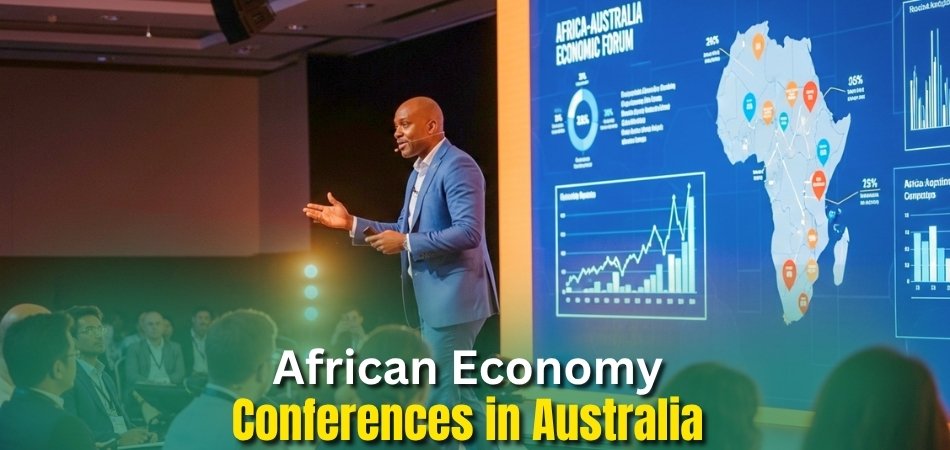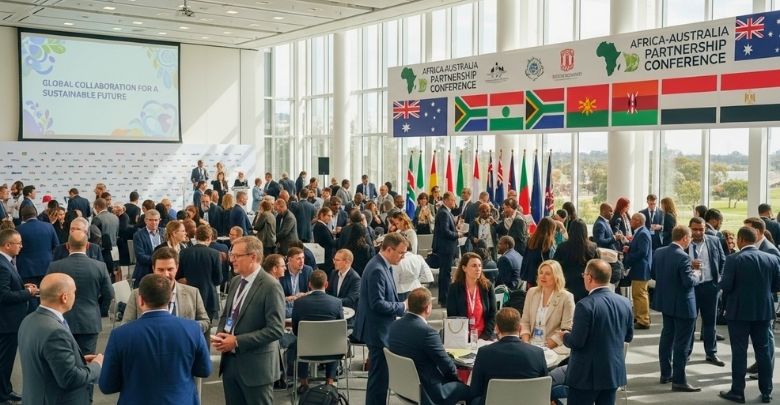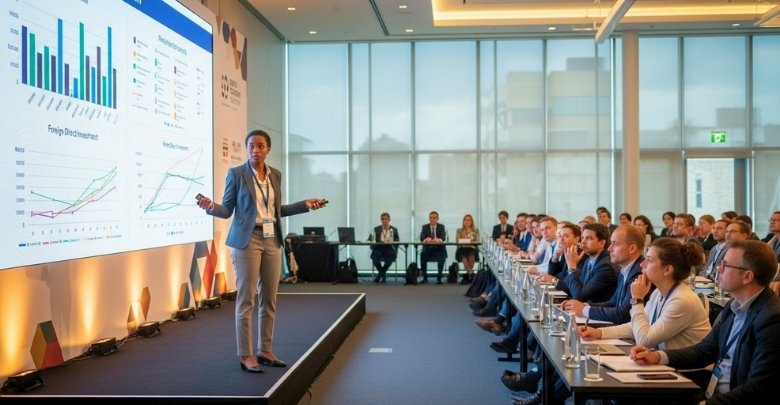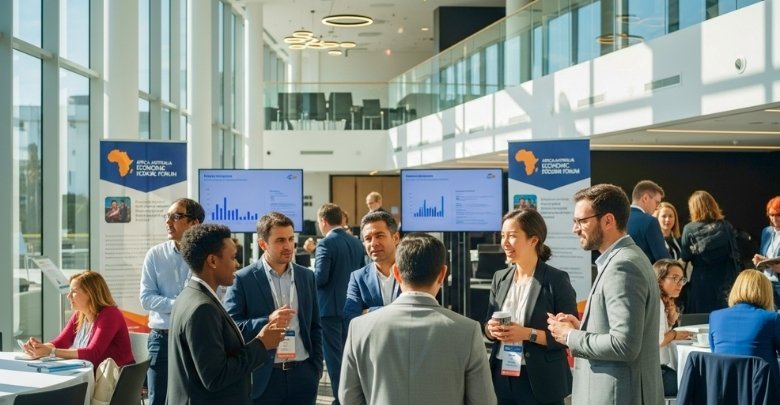African economy conferences are gaining a strong presence in Australia, attracting attention from academics, businesses, and policymakers. These gatherings are more than formal events; they serve as meeting points where people exchange ideas, create networks, and open new opportunities for growth. With topics ranging from trade to technology, they reflect how Africa and Australia are becoming closer partners.
Two such notable examples are the 69th Global Conference on African Economy and Culture, organized by the Global Conference Alliance, and the African Studies Conference in Sydney. Both highlight Africa’s role in shaping global discussions while giving Australia the chance to strengthen its ties. These events showcase how knowledge and collaboration can spark long-term development.
By exploring the Top 10 African Economy Conferences in Australia, readers can see how these events impact trade, education, business, and cultural ties. Continue reading to discover the upcoming conferences and learn how they contribute to shaping stronger Africa–Australia relations.
Top 10 African Economy Conferences in Australia
| Date | Conference List | Location |
| November 14-16, 2025 | 69th Global Conference on African Economy and Culture (GCAEC) | Sydney, Australia |
| 29th Mar 2026 | International Conference on African Studies and Education | Sydney, Australia |
| November 14-16, 2025 | 74th Global Conference on African Business and Technology (GCABT) | Sydney, Australia |
| February 02-03, 2026 | International Conference on Economy, Management and Marketing | Melbourne, Australia |
| 27–28 November 2025 | Monash Environmental Economics Workshop 2025 | Melbourne, Australia |
| April 27-28, 2026 | International Conference on Economic and Administrative Sciences | Washington, Australia |
| 31 August – 6 September 2026 | Blue Nile Program | Melbourne, Australia |
| August 30-31, 2026 | International Conference on Economic and Administrative Sciences | Sydney, Australia |
| 27th and 28th November 2025 | African Studies Conference | Sydney, Australia |
| October 04-05, 2026 | International Conference on Economy, Management and Marketing | Melbourne, Australia |
69th Global Conference on African Economy and Culture (GCAEC)
This event explores Africa’s economy alongside cultural exchange and development strategies. It brings together policymakers, researchers, and professionals to discuss trade and cooperation. Scheduled for November 14–16, 2025, in Sydney, Australia, this is one of the key conferences in Australia that emphasizes links between economic policy and cultural perspectives to build stronger collaborations across sectors.
International Conference on African Studies and Education
This event looks at the intersection of African education and development, covering themes like curriculum, equity, and policy reforms. Researchers, educators, and students are invited to present. The conference will be held in Sydney, Australia, on March 29, 2026, creating opportunities to understand African perspectives on educational change.
74th Global Conference on African Business and Technology (GCABT)
GCABT highlights business, trade, and the role of technology in shaping Africa’s economic growth. It brings together professionals from academic and commercial backgrounds. The conference runs from November 14–16, 2025, in Sydney, Australia, offering participants the chance to study innovation, entrepreneurship, and investment opportunities connected to African economies.
International Conference on Economy, Management and Marketing
This conference addresses issues in economics, management, and marketing with a focus on research and application. Experts and professionals will exchange insights into changing business landscapes. Held in Melbourne, Australia on February 2–3, 2026, the event invites participation from those working on both theoretical and practical aspects of economics.
Monash Environmental Economics Workshop 2025
The workshop highlights how economics interacts with environmental challenges, including climate change and natural resource management. Scholars will present their latest research findings. Taking place in Melbourne, Australia on November 27–28, 2025, the workshop fosters academic exchange and deeper discussions around the real-world implications of environmental economics.
International Conference on Economic and Administrative Sciences
The focus of this conference is on the role of administrative systems in economic growth. It brings together scholars and policymakers to share insights. Taking place in Washington, Australia on April 27–28, 2026, the program addresses governance, organizational performance, and administrative frameworks in relation to economics and development.
Blue Nile Program
The Blue Nile Program is designed as a week-long exploration of Africa’s cultural and economic issues. It connects Australian and African researchers in collaborative discussions. Scheduled for August 31 – September 6, 2026, in Melbourne, Australia, the program emphasizes scholarly exchange and engagement through seminars, workshops, and presentations.
International Conference on Economic and Administrative Sciences
This conference re-examines economic growth and administrative sciences with a focus on governance, efficiency, and innovation. It brings together academics and practitioners for dialogue. Happening in Sydney, Australia on August 30–31, 2026, the event provides a platform to analyze how administration shapes economic structures and long-term growth.
African Studies Conference
The African Studies Conference focuses on African societies, economies, and diaspora research. It invites scholars and practitioners to share diverse perspectives. Taking place on November 27–28, 2025, in Sydney, Australia, the event provides a space for debate on development, politics, and cultural experiences, highlighting the role of diaspora networks.
International Conference on Economy, Management and Marketing
The conference emphasizes applied research in economics, management, and marketing, with presentations from both academic and business circles. It aims to highlight challenges affecting industries today. Scheduled for October 4–5, 2026, in Melbourne, Australia, the program encourages participants to engage in case studies and real-world problem-solving.
Why African Economy Conferences in Australia Are Gaining Attention?
African economy conferences in Australia are attracting more attention as both regions deepen their partnerships. These events bring together academics, policymakers, and industry leaders to address shared opportunities. The growing focus spans resources, education, trade, and technology, creating a platform that highlights Africa’s role in global growth and Australia’s position as a strong partner. Here’s why these conferences are gaining attention.
Mining and Resource Development
Mining is one of the strongest links between Africa and Australia. Australian companies are active in African mining projects, and conferences provide spaces to discuss investment, sustainability, and future exploration. By hosting these discussions in Australia, both regions strengthen ties while exploring responsible resource development and economic opportunities.
Education and Academic Collaboration
Australian universities are building research and academic ties with African institutions. Conferences open opportunities to share knowledge, support student exchange programs, and discuss policies that improve higher education. These events also allow scholars to explore how education can drive economic growth and strengthen human capital development in African countries.
Technology and Innovation
Technology has become a bridge between Africa’s rapid digital growth and Australia’s tech expertise. Conference sessions often focus on fintech, mobile services, and digital infrastructure. Such discussions highlight how shared innovation can create long-term benefits, with Australia offering technical knowledge and Africa presenting dynamic markets eager for digital solutions.
Trade and Business Partnerships
Trade between Africa and Australia continues to expand, covering minerals, agriculture, and services. Conferences serve as meeting points for businesses and investors to build networks and explore new markets. These partnerships strengthen economic growth, provide opportunities for small and large businesses, and encourage balanced exchanges that benefit both regions.
As Africa and Australia look toward stronger ties, these conferences are becoming more important for shaping future partnerships. By focusing on mining, education, technology, and trade, they highlight areas where both regions can grow together. The rising attention reflects shared opportunities and a growing recognition of Africa’s place in Australia’s economic agenda.
How Do These Events Support Collaboration Between Africa and Australia?
Conferences on African economies in Australia are more than academic gatherings. They function as bridges that connect governments, businesses, and communities. By providing a platform for discussion, these events encourage meaningful partnerships, focusing on long-term collaboration that benefits both regions in policy, trade, education, and shared innovation. Here’s how these conferences help strengthen partnerships and create lasting collaboration between Africa and Australia.
Government Partnerships
These conferences allow government representatives to meet, discuss policies, and identify areas of cooperation. Agreements often emerge around trade regulations, infrastructure, and investment opportunities. By hosting these dialogues in Australia, officials can directly engage with African counterparts and establish diplomatic and economic ties that go beyond symbolic relationships.
Academic Collaboration
Universities and researchers play an important role by sharing studies and best practices. Academic sessions provide space for collaborative research on economics, social issues, and development. These exchanges strengthen joint projects, promote student mobility, and contribute to knowledge transfer that benefits both African institutions and Australian higher education networks.
Business and Investment Opportunities
For the business sector, these events open doors to partnerships in mining, agriculture, and technology. Investors and entrepreneurs use the conferences to explore new markets and build joint ventures. By meeting face-to-face, businesses reduce uncertainty and establish trust, making it easier to expand trade and investment between the two regions.
Cultural Diplomacy and Diaspora Engagement
Beyond economics, these gatherings highlight the African diaspora in Australia. Diaspora leaders and cultural voices contribute to discussions, reinforcing ties between communities. This cultural diplomacy builds mutual respect and understanding, while also strengthening economic opportunities by linking African communities abroad with policymakers and industry experts in Australia.
Collaboration between Africa and Australia grows stronger when governments, academics, businesses, and communities meet on the same stage. These conferences prove valuable not only for trade and policy but also for cultural and diaspora connections. The outcomes extend beyond the event halls, shaping long-term partnerships and shared economic futures.
The Role of Research and Policy in African Economy Conferences
African economy conferences in Australia act as platforms where research and policy connect. Policymakers, scholars, and researchers use these gatherings to present data, frameworks, and ideas. The focus often extends beyond academic debate, aiming to influence practical decisions that shape trade, sustainability, and development outcomes across both regions. Here is the role of research and policy in these conferences.
Evidence-based Policy Making
Researchers present detailed data on economic growth, trade patterns, and social outcomes. Policymakers use this information to refine regulations and programs. By grounding decisions in solid evidence, these conferences ensure that strategies for African economies are realistic, measurable, and responsive to the needs of communities and industries.
Sustainability and Climate Policy
Sessions often highlight the environmental challenges that affect African economies, including climate change and resource management. Experts share frameworks for sustainable practices, offering guidance on balancing growth with ecological responsibility. This dialogue allows policymakers to adopt informed policies that address sustainability in ways relevant to both Africa and Australia.
Trade Reform and Market Access
Trade remains a key theme, with scholars and officials examining how reforms can create fairer opportunities. Discussions often cover tariff policies, cross-border logistics, and regional trade agreements. By linking academic research with policymaker insight, these conferences identify pathways to expand market access while reducing economic barriers for African partners.
Development Strategies
Conferences also spotlight broader development policies, focusing on poverty reduction, healthcare, and education. Researchers provide evidence on what approaches have worked, while policymakers weigh these against national goals. These exchanges help align development strategies with economic frameworks, ensuring that growth policies are inclusive and support long-term social stability.
By combining research with policy, these conferences move beyond theoretical discussion. They create a space where scholars and decision-makers shape frameworks that matter in practice. From sustainability to trade reform, the role of research and policy in African economy conferences ensures that ideas translate into actionable strategies for growth.
What Participants Can Learn From Attending African Economy Conferences?
Attending African economy conferences in Australia offers participants much more than listening to presentations. These events create opportunities to meet professionals, learn directly from research and case studies, and gain exposure to African markets. For attendees, the real value comes from what they take back into their careers and businesses. Here is what participants can learn from these conferences:
Building Professional Networks
Conferences connect attendees with policymakers, business leaders, and academics. These networking opportunities often lead to partnerships or collaborative projects. For participants, exchanging contacts and engaging in side discussions can be just as valuable as formal sessions, opening doors to future ventures in both African and Australian contexts.
Gaining Knowledge and Insights
Presentations and panel discussions share new research findings, policy frameworks, and market trends. Participants leave with insights that may not be available elsewhere. By engaging with speakers and asking thoughtful questions, attendees can deepen their understanding of Africa’s economic landscape and apply lessons directly to their own work.
Exposure to African Markets
One of the main advantages is learning how African economies function and identifying areas for collaboration. Sessions often highlight opportunities in industries such as mining, technology, and agriculture. This exposure helps participants evaluate potential markets, adapt business strategies, and spot openings for investment or partnership that might otherwise go unnoticed.
Tips for Making the Most of Attendance
Preparation matters: reviewing the program, setting clear goals, and planning questions for speakers can maximize the experience. Taking notes, attending workshops, and following up with contacts afterward ensures participants get long-term benefits. Being proactive helps transform a conference from a one-time event into a lasting professional opportunity.
For participants, African economy conferences in Australia provide a chance to learn, connect, and explore opportunities that extend beyond the conference halls. By focusing on networking, knowledge exchange, and exposure to markets, attendees can translate their experiences into meaningful career growth and stronger ties between Africa and Australia.
Building Future Networks Through African Economy Conferences in Australia
African economy conferences in Australia are not just about immediate discussions; they set the foundation for long-term cooperation. By creating spaces where ideas and contacts evolve into partnerships, these events help shape the future of Africa–Australia relations. They also reflect Africa’s growing role in global growth and Australia’s strategic interest. Here’s how these conferences help build lasting networks.
Strengthening Business Ties
Businesses use these conferences to establish partnerships that may extend years into the future. Start-ups, investors, and established firms often meet for the first time at such events. Continued engagement after the conference ensures that initial introductions lead to contracts, joint ventures, and ongoing collaborations across industries.
Expanding Academic and Research Partnerships
Universities and research institutions see these events as opportunities to expand joint projects. Collaborative research on economics, environment, or social policy often begins with conversations at conferences. By formalizing these discussions into agreements, both African and Australian institutions contribute to long-lasting knowledge exchange and innovation.
Engaging the African Diaspora
The African diaspora in Australia plays a vital role in sustaining networks created at conferences. Diaspora participants often act as cultural and economic bridges, keeping dialogue active between events. Their involvement ensures that collaboration continues in everyday business, community projects, and policymaking beyond the official conference dates.
Positioning Africa in Global Growth
Conferences highlight Africa’s role as one of the fastest-growing regions in the world economy. By recognizing this potential, Australia positions itself as a reliable partner for trade, investment, and research. This forward-looking perspective helps establish networks that align with global growth patterns and strengthen bilateral relations.
The networks built at African economy conferences in Australia extend well beyond the sessions themselves. By fostering business ties, academic collaboration, and diaspora engagement, these gatherings ensure sustainable cooperation. Looking ahead, they will continue to shape Africa’s global role while reinforcing Australia’s position as a trusted partner in growth.
Frequently Asked Questions
Conferences often leave readers with practical questions about participation, impact, and future opportunities. Below are some common queries people may have after learning about African economy conferences in Australia, answered in a clear and approachable way.
Who Can Attend African Economy Conferences in Australia?
Anyone interested in Africa–Australia connections can attend, including students, researchers, business owners, and policymakers. These conferences welcome diverse perspectives from multiple fields. Registering in advance ensures you get access to sessions and networking opportunities.
Do I Need Special Knowledge to Join These Conferences?
No advanced expertise is required to attend. While researchers and professionals present in-depth studies, sessions are designed to be accessible for general participants as well. Attendees gain valuable insights regardless of their background.
How Do These Conferences Benefit Local Australian Communities?
They bring global conversations to local settings, encouraging cultural exchange and business opportunities. Local suppliers, universities, and small businesses often engage with visiting delegates. This creates both economic activity and cross-cultural understanding within Australian cities.
Can Students and Young Professionals Participate Actively?
Yes, many conferences encourage student and early-career professional involvement. Opportunities often include presenting papers, volunteering, or joining discussion panels. It’s a great way for younger voices to gain visibility and experience.
Are Virtual Attendance Options Available?
Some conferences offer hybrid formats with online participation. Virtual attendees can join sessions, listen to presentations, and even network through digital platforms. This option makes it easier for people who cannot travel.
What Kinds of Networking Opportunities Can I Expect?
Networking happens in formal sessions, panel discussions, and informal breaks. Attendees can connect directly with business leaders, policymakers, and academics. These connections often lead to collaborations, partnerships, or long-term professional relationships.
How Do I Stay Updated About Future Conferences?
Conference organizers usually update information on their official websites and mailing lists. Following academic societies, business councils, or African diaspora groups in Australia is also helpful. Social media announcements provide regular reminders and updates.
Concluding Words
The Top 10 African Economy Conferences in Australia highlight how both regions are building stronger links through dialogue, research, and partnerships. These events are not just about academic exchange but also about creating practical solutions for shared growth.
From trade and mining to education and technology, the conferences provide a platform where ideas turn into action. Participants gain new insights, meet valuable contacts, and explore opportunities that stretch beyond the event halls.
Looking ahead, these gatherings will continue to shape collaborations that benefit both Africa and Australia. By attending or following these events, readers can better understand the value of connecting economies, cultures, and communities. It’s the right time to engage and explore the opportunities they offer.









